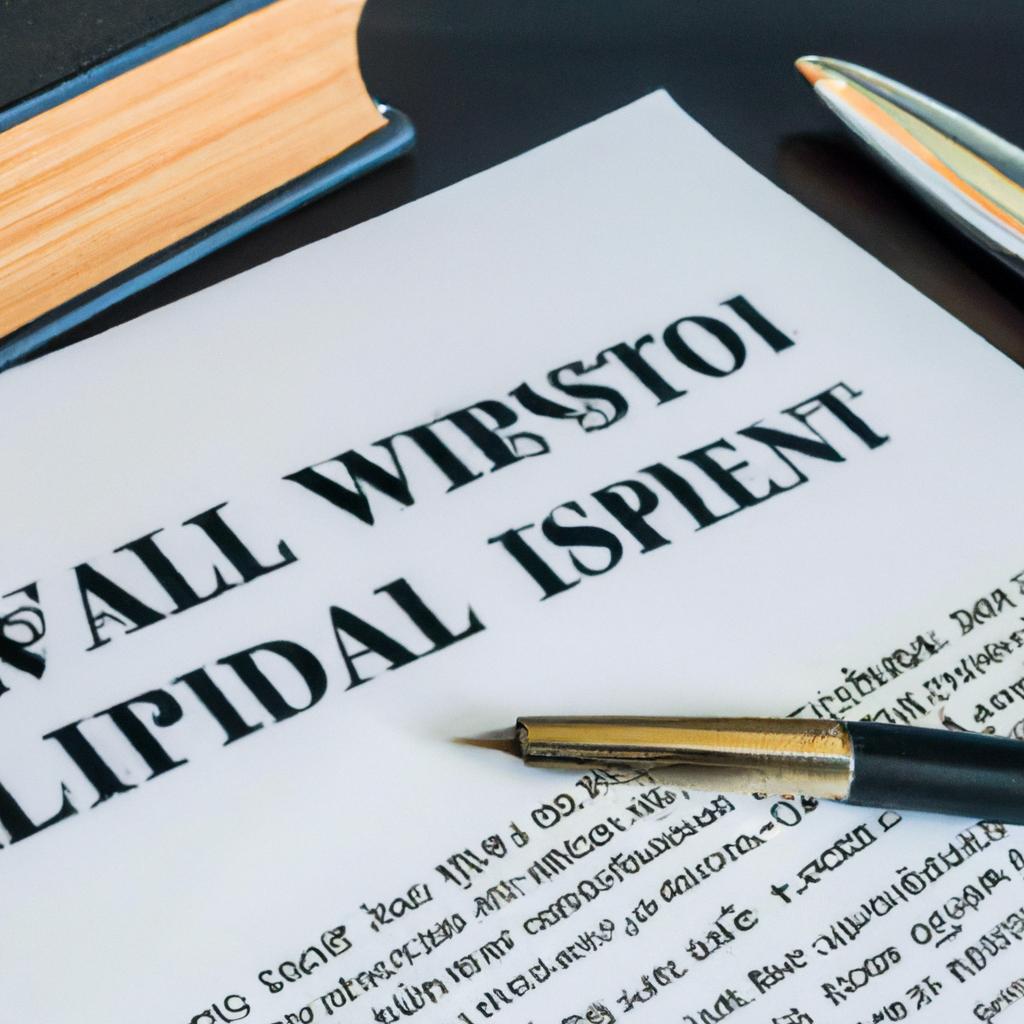In the intricate realm of legal procedures, perhaps none are as solemn and weighty as the execution of a Last Will and Testament. Determining the timeline for the execution of a will is a process fraught with nuance and complexity, necessitating a keen understanding of the intricacies of the law. As seasoned practitioners in the field of estate planning and probate, the Morgan Legal Group of New York City stands ready to navigate this journey with you, ensuring that the final wishes of the testator are honored in a timely and efficient manner. Join us as we delve into the question: how long does it take for a will to be executed
Understanding the Process of Executing a Will in New York
It is essential to understand the process of executing a will in New York to ensure a smooth and efficient distribution of assets according to the deceased’s wishes. The time it takes for a will to be executed can vary depending on various factors, such as the complexity of the estate, any potential disputes among beneficiaries, and the efficiency of the executor.
Generally, the process of executing a will in New York can take anywhere from a few months to a year or more. It involves several steps, including probate, identifying and valuing assets, paying off debts and taxes, and distributing assets to beneficiaries. Hiring an experienced estate planning attorney can help expedite the process and ensure that the will is executed in a timely manner.

Factors Affecting the Timeline for Will Execution
can vary depending on several key elements. One crucial factor is the complexity of the will itself. If the will is straightforward and uncontested, the execution process may proceed more quickly. However, if there are complex assets, multiple beneficiaries, or potential disputes, the timeline can be extended significantly.
Another factor that can impact the timeline for will execution is the efficiency of the probate court in which the will is being executed. Some probate courts may be backlogged with cases, causing delays in the execution process. Additionally, the availability of key parties, such as executors, beneficiaries, and lawyers, can also affect the timeline. Communication and cooperation between all parties involved are essential for a smooth and timely execution process. Ensuring all necessary documents are in order and promptly filed can also expedite the execution timeline.
| Factors Affecting Timeline for Will Execution |
|———————————————–|———————————————-|
| Complexity of the will | Efficient probate court |
| Number of beneficiaries | Availability of key parties |
| Potential disputes | Communication and cooperation |
| Backlog in probate court | Proper documentation |
Key Steps to Expedite the Probate Process for Efficient Will Execution
When it comes to expediting the probate process for efficient will execution, there are key steps that can be taken to ensure a timely resolution. One important step is to gather all necessary documentation and information related to the deceased’s assets and debts. This includes the will itself, as well as any bank statements, property deeds, and other relevant paperwork.
Another crucial step is to work closely with an experienced probate attorney who can guide you through the process and help navigate any potential obstacles that may arise. By following these key steps and seeking professional legal assistance, you can help ensure a smooth and efficient probate process, allowing for the timely execution of the will and distribution of the deceased’s assets to their intended beneficiaries.

Consulting an Experienced Estate Planning Attorney for Timely Will Execution
Consulting an experienced estate planning attorney is crucial for timely will execution. The process of executing a will can vary depending on the complexity of the estate and any potential legal challenges that may arise. There are several key factors that can impact how long it takes for a will to be fully executed:
- Probate Process: The length of time it takes to probate a will can vary depending on the state in which the deceased person resided and the complexity of the estate.
- Creditor Claims: If there are outstanding debts or creditor claims against the estate, this can delay the distribution of assets to beneficiaries.
- Contested Wills: If there are disputes or challenges to the validity of the will, this can significantly prolong the execution process.
By working with an experienced estate planning attorney, you can ensure that your will is executed efficiently and in accordance with your wishes. At Morgan Legal Group, our team of seasoned attorneys can guide you through the estate planning process, help you draft a comprehensive will, and provide ongoing support to ensure that your wishes are carried out in a timely manner.
Q&A
Q: How long does it typically take for a will to be executed after someone passes away?
A: The timeline for executing a will can vary depending on a number of factors, including the complexity of the estate and any potential disputes among beneficiaries.
Q: What are some common steps involved in the execution of a will?
A: Some common steps in the execution of a will include probate court proceedings, identifying and valuing assets, paying outstanding debts and taxes, and distributing assets to beneficiaries.
Q: Are there any circumstances that can cause delays in the execution of a will?
A: Yes, delays can occur if there are disputes among beneficiaries, if the estate is particularly complex, or if there are challenges to the validity of the will.
Q: Can the executor of a will speed up the process of execution?
A: Yes, the executor can help expedite the process by being organized, communicating effectively with all parties involved, and following all legal requirements and deadlines.
Q: What happens if there is no will in place at the time of someone’s passing?
A: If someone passes away without a will, their estate will be distributed according to state law, which may not align with their wishes. This process is known as intestate succession.
Future Outlook
As we come to the end of our exploration into the timeline of a will’s execution, it becomes clear that the process can vary widely depending on the complexity of the estate and the diligence of the executor. From probate court proceedings to asset distribution, each step plays a crucial role in ensuring the deceased’s final wishes are carried out. While the path may be long and arduous, the ultimate goal of upholding the will remains steadfast. So, whether it takes months or even years, patience and perseverance are key in the journey towards fulfilling the intentions of the departed.
 The death penalty has been a highly debated and controversial topic for decades. One of the key questions that often arises when discussing capital punishment is how long it takes for an individual to be executed after receiving a death sentence. The short answer is that the length of time varies depending on several factors, such as the state in which the sentence was given, appeals processes, and the method of execution. In this article, we will delve deeper into the factors that can affect the time frame for an execution and provide valuable insights on the subject.
The death penalty has been a highly debated and controversial topic for decades. One of the key questions that often arises when discussing capital punishment is how long it takes for an individual to be executed after receiving a death sentence. The short answer is that the length of time varies depending on several factors, such as the state in which the sentence was given, appeals processes, and the method of execution. In this article, we will delve deeper into the factors that can affect the time frame for an execution and provide valuable insights on the subject.
The Timeframe for an Execution
The time frame for an execution can range from several months to several decades. According to research, the average time spent on death row before an execution in the United States is 15 years, but this can vary widely depending on the individual case.
Factors That Affect the Time Frame for an Execution
1. State Laws
The first and most significant factor that determines the time frame for an execution is the state in which the sentencing took place. Each state has its own laws and procedures for carrying out the death penalty, and these laws can differ significantly. Some states have a streamlined and expedited process for executions, while others have lengthy appeals processes that can last for years. Additionally, some states have halted executions altogether, which can result in a longer time frame for individuals on death row.
2. Appeals Process
One of the major reasons for the varying time frame of executions is the appeals process. After a death sentence is handed down, the convicted individual has the right to appeal their case. This process can significantly impact the overall time frame for an execution. Depending on the state, there can be multiple levels of appeals, which can result in further court hearings and trials. This process can stretch out for years, especially if new evidence or witnesses come forward.
3. Method of Execution
The method of execution can also have a significant impact on the time frame for an execution. Currently, there are five methods of execution used in the United States: lethal injection, electrocution, gas chamber, firing squad, and hanging. Lethal injection is the most commonly used method, and it can take several years for an individual on death row to exhaust all the available appeals and be scheduled for an execution by lethal injection. On the other hand, states that allow the use of other methods, such as electrocution or firing squad, may have a quicker process for executions.
The Process of an Execution
Once all the appeals have been exhausted and a final execution date has been set, a series of events must take place before the execution can occur. The process can vary depending on the state but generally follows the same steps.
1. The Warrant
Before an execution can take place, a warrant must be issued by the governor or a state-appointed authority. This warrant specifies the date, time, and method of execution.
2. Final Meeting and Last Meal
The condemned individual is given the opportunity to meet with their loved ones or spiritual advisors before the execution. They are also given the option to choose their final meal.
3. The Execution
On the day of the execution, the convicted individual is taken to a designated room or area within the prison. They are then given the opportunity to make a final statement before the execution takes place.
4. After the Execution
Following the execution, the body is taken for a post-mortem examination, and the state notifies the family of the deceased. The body is then released to the family for burial or cremation.
Practical Tips for Families and Loved Ones
Having a loved one on death row can be an emotionally taxing and challenging experience. If you or someone you know is facing this situation, here are some practical tips you can follow to navigate through this time:
1. Seek Support
It is essential to have a strong support system during this difficult time. Reach out to family, friends, or support groups who can offer emotional support and guidance.
2. Seek Legal Counsel
If possible, seek legal advice from a professional who specializes in death row cases. They can provide valuable insights and assistance with navigating the appeals process.
3. Stay Connected
Keep in touch with your loved one on death row through letters, phone calls, or visitation if permitted by the prison. This can provide comfort and a sense of connection during the lengthy process.
Real-Life Stories
There have been numerous cases throughout history that demonstrate the varying time frame for executions. For example, in 1983, Texas inmate Henry “Hank” Skinner was sentenced to death for the murder of his girlfriend and her two sons. He spent 20 years on death row before the U.S. Supreme Court granted him the right to DNA testing. It was this evidence that ultimately resulted in his sentence being commuted to life in prison.
On the other hand, in 2013, Ohio inmate Ronald Phillips was executed just over three years after being sentenced to death for the rape and murder of a three-year-old girl. His case was expedited due to the heinous nature of the crime and the lack of any doubt of his guilt.
In Conclusion
The time frame for an execution can vary significantly, depending on factors such as state laws, appeals processes, and the method of execution. Regardless of one’s stance on the death penalty, it is important to understand the process and what families and loved ones may go through during this difficult time. Seeking support, staying connected, and having legal guidance can make the process of having a loved one on death row more manageable.

